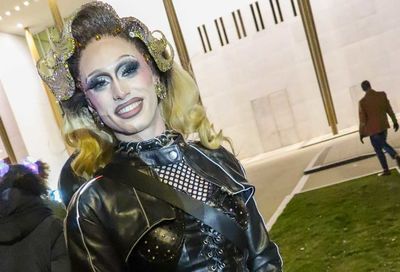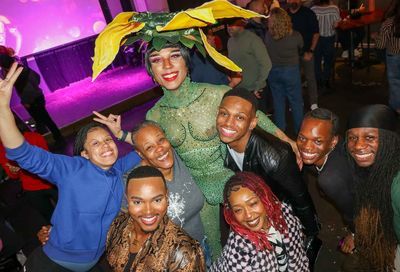The Fantastic Mr. Fox
As one of its most popular filmmakers, Eytan Fox has helped turn Israel into a remarkably gay-friendly country

Eytan Fox
(Photo by Ziv Sade)
MW: One thing I find notable about your films is that music is always a factor. Sometimes it’s a small part, but always a significant part.
FOX: Yeah, it always is significant. Music is important and significant in everyone’s life — almost everyone that I know. And I use it in order to describe or characterize a character. Sometimes different musical tastes define different people, different worlds, different psyches. In Walk on Water, I really have two characters — one very macho, straight, Mossad [Israeli security force]; the other is a gay, young German. And they really have a fight about their musical tastes. They have a constant argument about their different musical tastes.
MW: Do you have a musical background?
FOX: I studied piano when I was a kid, but I was never really a musician. I was actually a dancer. I thought I’d be a dancer when I was young. But then I had to join the Israeli Army at 18 for four years, and realized I won’t be a dancer. And chose to be a film director, which is probably for the best.
MW: You were born in New York, grew up in Jerusalem, then moved to Tel Aviv for college, came out and never looked back? You’re still living there to this day?
FOX: Tel Aviv is the city that all the young people — and all the modern, secular, normal people — flee to. It’s our big, modern, vibrant city. It’s a wonderful city.
But you know what? Israel has changed in amazing ways, really. I mean, growing up in Jerusalem, the word “gay” did not exist. We didn’t even have the word. It was a very unknown concept, homosexuality. But today, the world has become such a small place. People who live in Jerusalem, young people, they saw my films and television work. They know that gays exist. They’re exposed to cable television and satellite and Internet. And they watch all the television shows that come from all over the world that have gay characters. And they’re exposed to gay websites from all over the world. So, it’s not as much fun as it is in Tel Aviv, I think, but there are gay people in Jerusalem.
MW: That’s one thing you capture in Yossi & Jagger, from 2002, and the sequel Yossi from two years ago: the remarkable change in only one decade in attitudes toward the LGBT community in Israel.
FOX: Israel has changed in amazing ways. And I’m really proud to say that I think that I’ve been part of that change. My films and television work — I’ve worked very hard at making these changes happen. And Tel Aviv has become really a mecca, a paradise, for gay men and women from all over the world. It’s really amazing. It’s so gay-friendly. It’s full of options for gay people. There are hundreds of gay couples with their kids roaming down the streets of Tel Aviv. And there are parties and nightlife, and so many things.
MW: How long have you and your partner Gal Uchovsky been together? And are you one of those couples with kids roaming the streets of Tel Aviv?
FOX: No. We don’t have kids. We met 26 years ago, when I was a young film student. I was directing the Israeli Academy Awards ceremony, something like that. I had just finished film school and they kind of took me to direct this big ceremony, and Gal was a journalist at the time, writing about that ceremony. That’s how we met. ‘
MW: What’s the secret to your relationship? It’s not only personal but also professional, since you often co-write your films together.
FOX: First of all, we don’t really make films together anymore. We realized that’s too much. To live together, maintain this relationship and family, and work together…. We try not to work together as much anymore. What is the secret? You know, the answers always sound like clichés. Friendship is the most important thing.
MW: When did you come out?
FOX: When I was about 24. I finished my army service, I moved to Tel Aviv, I started studying film. And then I met Gal. I think after I had Gal in my life, I was brave enough and strong enough to go to my parents and say, “I’m gay, and this is my life, this is my partner.”
MW: I understand your parents passed away in recent years. Did they ever come around to accepting you and Gal? Are you close to your remaining family?
FOX: Yeah. My mother became very close to Gal immediately. And my father went through a very interesting process, starting with my coming out. He started going to therapy, which he never did before, and really became a much better person. And he became friends with Gal. It was a very nice journey that he took, and I was there to see it happen. I think the last thing he said to me before he died was something very nice about my relationship with Gal. He said something about how he realizes that Gal is so wonderful for me.
Both my brothers have gone back to the states. So it’s only me and then all my alternative family, my close friends, and Gal’s family is here. He has a relatively big family in Israel.
MW: You were closeted when you were in the army.
FOX: Of course. This was 1982, the world was a different place. Israel was certainly a different place. It was war, so no one could know.
MW: I know it’s mandatory for every young Israeli to enlist, but, for example, the openly gay character Tom in Yossi talks about the possibility of leaving the army before completing his term, in order to stay with his lover Yossi. How common is that?
FOX: That’s still a very radical, radical statement that he gives there: That he will leave the army. It’s kind of extreme. But Israel has changed, and there’s not only one option for young people. The Israel I grew up in had only one option for every man who grew up in it: You had to be straight, you had to be a soldier, you had to be a certain kind of man, who does certain kinds of things. And options have opened and changed.’
MW: How much do you identify with the character of Yossi?
FOX: Yossi is probably the character I most identify with from all my characters. I find Yossi my most personal film, and I feel closest to it. It deals with all kinds of issues that I guess I’m dealing with — like getting older, and asking questions about who you are and what you’ve accomplished. And your past and your traumas. And what you’ve managed to deal with, and what you haven’t dealt with, and should be dealing with. All kinds of questions like that.
MW: It’s a really touching film. And it takes a turn I didn’t see coming. Because it starts so stark, and kind of lonely, and then it ends on a hopeful note. And sweet.
FOX: I was accused a few times in the past of being not as hopeful as people wanted me to be. So I guess I’m becoming more hopeful as years go by.
MW: Did you know you were going to do a sequel to Yossi & Jagger years ago? Why did it take so long?
FOX: Not at all. Why did it take a decade? I don’t really know. It takes time to go back and reflect on things that happen. You don’t do that after a year or two. You can, but you don’t really have the perspective and the time.
Support Metro Weekly’s Journalism
These are challenging times for news organizations. And yet it’s crucial we stay active and provide vital resources and information to both our local readers and the world. So won’t you please take a moment and consider supporting Metro Weekly with a membership? For as little as $5 a month, you can help ensure Metro Weekly magazine and MetroWeekly.com remain free, viable resources as we provide the best, most diverse, culturally-resonant LGBTQ coverage in both the D.C. region and around the world. Memberships come with exclusive perks and discounts, your own personal digital delivery of each week’s magazine (and an archive), access to our Member's Lounge when it launches this fall, and exclusive members-only items like Metro Weekly Membership Mugs and Tote Bags! Check out all our membership levels here and please join us today!
























